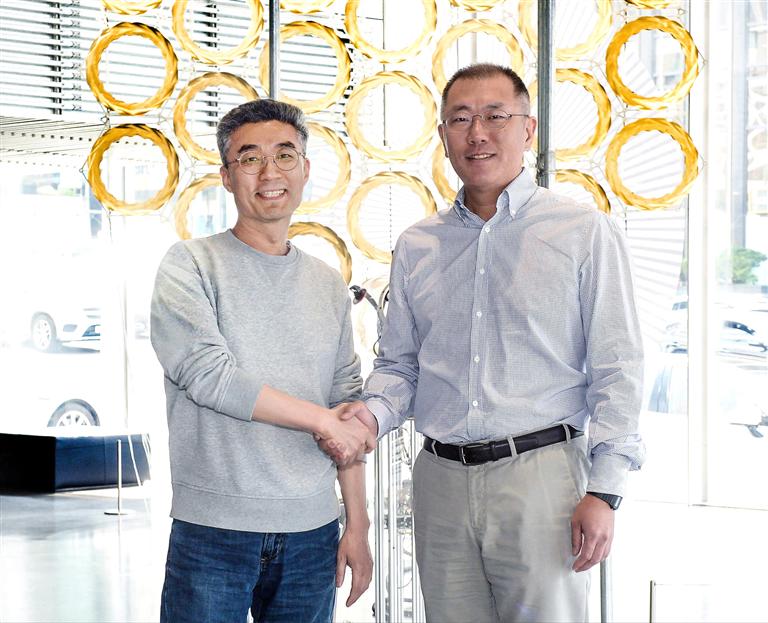Korean startups raking in big investment money
By Feb 13, 2020 (Gmt+09:00)
LG Chem to sell water filter business to Glenwood PE for $692 million


Kyobo Life poised to buy Japan’s SBI Group-owned savings bank


KT&G eyes overseas M&A after rejecting activist fund's offer


StockX in merger talks with Naver’s online reseller Kream


Mirae Asset to be named Korea Post’s core real estate fund operator


One venture capital (VC) insider singled out Bionetix as a startup that "stands out in the areas of glaucoma and intractable illnesses, all of which are considered blue ocean opportunities," adding that receiving 10 billion won worth of investment isn't difficult for any company with a meaningful differentiation.
Some 100 startups raise over 10 billion won
Roughly 100 startups brought in over 10 billion won in funding in 2019. Woowa Bros. topped the list by selling 87 percent of its stake for 4.1 trillion won, followed by cosmetics maker Have & Be, which owns skincare brand Dr. Jart (1.3 trillion won acquisition), and Yanolja (214 billion won), among other startups that are eight to 15 years old. All of them were bought out by other companies.
Quite a few raked in hefty amount of funding in the Series A round, the first round of financing startups seek from investors. Fifteen startups raised more than 10 billion won in the Series A round alone this year. As the VC market heats up, more investors are making bold bets on promising companies.
Megazone Cloud, which was selected by LG CNS to partner and expand its cloud business, brought in 48 billion won in Series A investment last March.
Hyundai Motor's strategic partner Code42, a self-driving technology start-up, raised 30 billion won last October. Code42 was founded in March, which makes it less than a year old.

Besides these names, Alzheimer's treatment developer Amyloid Solution garnered 14.5 billion won, aerospace startup Perigee Aerospace (14 billion won), game developer Royalcrow (13.4 billion won), education technology startup Class101 (12 billion won) and media commerce startup (12 billion won) in their first round of financing.
"Just two years ago, raising 5 billion won in Series A meant a huge win, but now the bar for success has gone up to more than 10 billion won," said one start-up boss.
Betting on CEO's reputation
A growing number of investors are throwing in more than 10 billion won just by trusting the name of the founder. Code42 is a prime example. Industry experts credit founding CEO Song Chang-hyun's personal brand as the primary reason the company was able to reap more than 30 billion won in investment.
Song studied computer science at Iowa State University and Purdue University in the US. He then went on to build his career at Microsoft and Apple, among other information technology (IT) firms. In 2008, Song switched over to Naver, where he served as Chief Technology Office (CTO) and CEO of Naver Labs, the R&D arm of Naver. He road mapped Naver's future technology. An industry insider said, "Among developers, Song is known as the godfather. He is unmatched not only in technology, but also in network."
It's not always the CEO's brand name that attracts investment. Sometimes an innovative product that reflects the current trends is enough to win big. In September, CrowdWorks raised 10 billion won in Series A with its highly-regarded artificial intelligence (AI) data marketplace. Balaan, a luxury fashion marketplace, which stood out from existing luxury shopping platforms with a unique inventory control system, also brought in 10 billion won in the Series A round. The two startups are two- and four-years-old, respectively.
The driving force behind the continuous success spree of startups is the growing number of startup friendly VCs and accelerators. Particularly, the number of accelerators jumped by five-fold in two years as word spread that investment in startups is promising. From small- and medium-sized businesses to large corporations, the pool of investors expanded extensively. Plus, an increase in related government budget also contributed to making the startup industry's pockets to get deeper, experts echo.
Money, however, isn't always equally dispersed. One VC insider said, "Overall investment went up for sure, but spending is concentrated on only a limited number of startups. Most end up without any capital despite their year-long efforts to attract investors."
Write to Hee Eun Yoon at soul@hankyung.com
-

-
 The KED ViewDon’t dwell on Korea discount; light up visibility on global stage
The KED ViewDon’t dwell on Korea discount; light up visibility on global stageJul 10, 2024 (Gmt+09:00)
-

-

-



